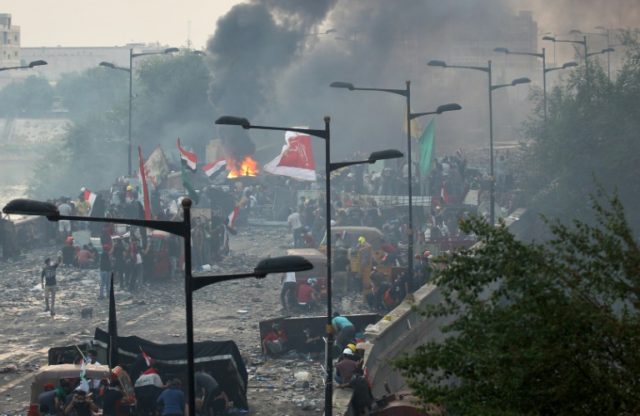Baghdad (AFP) – Honking cars and blaring music filled the streets of the Iraqi capital early Tuesday, as thousands including students kept up anti-government protests despite a curfew declared by the army.
Swathes of Iraq have been engulfed by two waves of demonstrations this month over unemployment and corruption that have evolved into demands for regime change.
The rallies have gathered despite temporary curfews, threats of arrest and violence that has left nearly 240 people dead, including five protesters killed in Baghdad on Monday.
That evening, the military said cars and foot traffic would be barred in the capital for six hours starting at midnight (2100 GMT), sparking concern security forces would storm protest camps in Baghdad.
But as the curfew came into effect, people were still streaming into Baghdad’s iconic Tahrir (Liberation) Square in cars and on foot.
Three-wheeled vehicles known as tuk-tuks ferried people to Tahrir, and a cacophony of car horns from accumulating traffic could be heard from surrounding neighbourhoods.
It was the fifth consecutive night that protesters have occupied the square, clinging on despite heavy tear gas used to keep protesters from storming the Green Zone, which hosts government offices and foreign offices.
They had otherwise been allowed to set up tents in Tahrir and taken over multi-storey buildings there since Thursday in a marked departure from the response during the first week of this month.
Protests have also persisted across the country’s Shiite-majority south, with night-time rallies in the holy city of Karbala spiralling into skirmishes with security forces.
– Syndicates on strike –
Protesters have been joined by a huge contingent of students, who joined despite stern warnings by the higher education minister and the prime minister’s office that they should “stay away.”
“No school, no classes, until the regime collapses!” boycotting students shouted on Monday in Diwaniyah, south of the capital.
Other student protests gathered in the southern cities of Nasiriyah, Hillah and Basra — and even the holy city of Najaf.
The national teachers’ syndicate announced a four-day strike and the lawyers’ union also told its members to boycott the courts for several days.
“Qusay al-Suhail (the higher education minister) said not to come down into the streets. But we say: no nation, no class!” one student protester said.
“All we want is for the government to immediately submit its resignation. Either it resigns, or it gets ousted.”
About 60 percent of Iraq’s 40-million-strong population is under the age of 25.
But youth unemployment stands at 25 percent and one in five people live below the poverty line, despite the vast oil wealth of OPEC’s second-largest crude producer.
Anger at inequality and accusations that government corruption was fuelling it sparked protests in Baghdad on October 1 that have since attracted growing numbers of young people.
On Monday, a small group of students brought kits to Tahrir Square to treat people affected by tear gas along with cans of Pepsi — believed to alleviate discomfort when splashed on the face.
“It’s my first day at the protests. I told my mom I’m going to class, but I came here instead!” a girl with curly hair told AFP.
The protests are unprecedented in recent Iraqi history for their ire at the entire political class, with some even criticising traditionally revered religious leaders.
– Parliamentary paralysis –
On Monday, Iraq’s parliament voted to dissolve the provincial councils, cancel the extra privileges of top officials and summon embattled Prime Minister Adel Abdel Mahdi for questioning.
Abdel Mahdi has proposed a laundry list of reforms, including hiring drives, increased pensions and promises to root out corruption.
President Barham Saleh has also held discussions with the UN on electoral reform and amendments to the 2005 constitution, but they have not appeased protesters.
In solidarity with demonstrators, four lawmakers resigned late on Sunday, and the largest parliamentary bloc has been holding an open-ended sit-in since Saturday night.
Saeroon, the bloc tied to firebrand cleric Moqtada Sadr, said it was dropping its support for Abdel Mahdi.
The move has left the premier more squeezed than ever, as Saeroon was one of the two main sponsors of his government.
The other was Fatah, the political arm of the Hashed al-Shaabi paramilitary force, which has said it would continue to back the central government.
Several Hashed offices have been torched in recent days in southern Iraq, prompting vows of “revenge” from its leaders.
Sadr responded Sunday, warning them: “Do not champion the corrupt. Do not repress the people.”
North of Baghdad late Monday, two mortar rounds hit the military base of Taiji where US troops are deployed, a security source said.
There were no reports of damage or casualties, and the attack was not claimed.

COMMENTS
Please let us know if you're having issues with commenting.